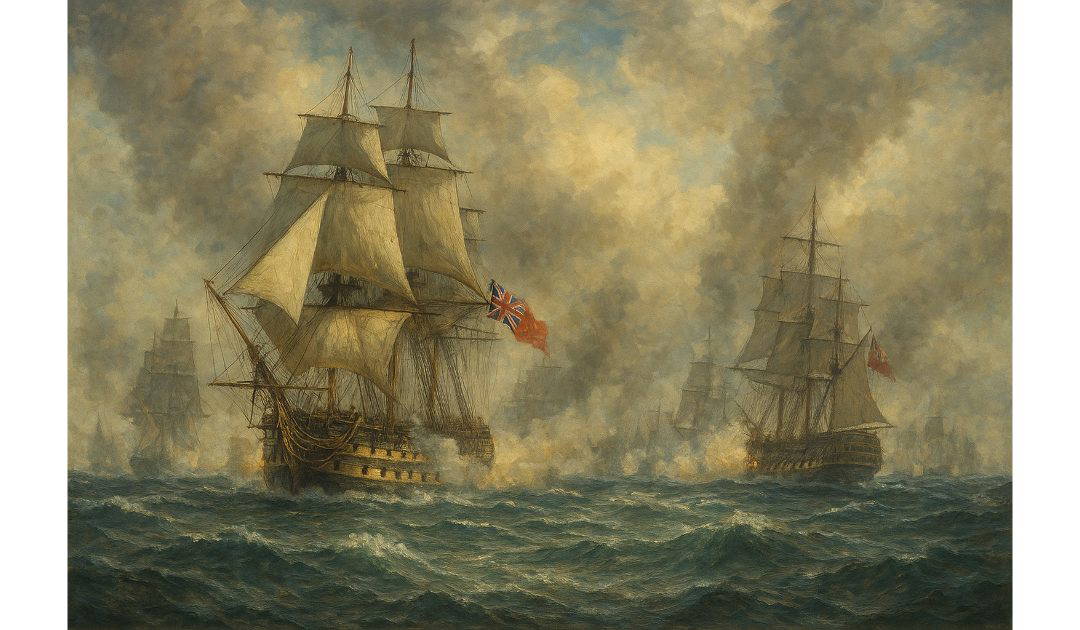The Battle of Trafalgar was fought on the 21st of October, 1805. So when I crack open a bottle of something alcoholic this evening I shall say the toast, ‘to the immortal memory of Lord Nelson and those who fell with him.’ I have written about the use of intelligence at Trafalgar, and an earlier victory of Nelson’s at the Battle of Cape St. Vincent, but today we must look at Trafalgar and Nelson.
The battle took place off the southwest coast of Spain, near Cape Trafalgar, during the Napoleonic Wars. The British Royal Navy, under the command of Vice-Admiral Horatio Nelson, faced the combined fleets of France and Spain. The outcome not only secured British naval supremacy but also immortalised Nelson as one of Britains greatest military heroes.
The geopolitical backdrop to the Battle of Trafalgar was the rise of Napoleon Bonaparte, who sought to expand French dominance across Europe. Britain, an island nation dependent on maritime prowess, posed a substantial obstacle to Napoleon’s ambitions. To facilitate an invasion of Britain, Napoleon needed control over the English Channel, which required neutralising the Royal Navy. The French and Spanish fleets, stationed in various ports, were instructed to unite and establish naval superiority.
Vice-Admiral Horatio Nelson, known for his audacity, strategic brilliance, and charismatic leadership, played an instrumental role in countering Napoleons plans. Born on the 29th of September, 1758, in Burnham Thorpe, Norfolk, Nelson joined the Royal Navy at the age of 12. His naval career was marked by rapid advancement due to his tactical ingenuity and bravery in battle. Despite suffering severe injuries in earlier engagements, losing the sight in one eye and the use of an arm, Nelson remained undeterred.
Leading up to Trafalgar, the French fleet, under Vice-Admiral Pierre-Charles Villeneuve, attempted to evade the British blockade and unite with Spanish forces. Nelson, commanding the British fleet aboard HMS Victory, pursued them relentlessly. When the combined Franco-Spanish fleet anchored near Cadiz, Nelson devised an unorthodox battle plan that deviated from traditional naval tactics, which typically involved parallel lines of ships exchanging broadsides.
Nelson formulated a daring strategy to split his fleet into two columns, aiming to break through the enemy line perpendicularly. This manoeuvre, known as “crossing the T,” allowed the British to rake the enemy ships with devastating cannon fire while minimising exposure to return fire. Nelsons approach was high-risk but showcased his confidence in British naval gunnery, discipline, and seamanship.
On the morning of the 21st of October, Nelson sent a signal to his fleet that has since become legendary: “England expects that every man will do his duty.” This simple yet powerful message bolstered the morale of British sailors as they advanced towards the enemy. As the British fleet closed in, HMS Victory led the charge, enduring heavy fire as it penetrated the Franco-Spanish line.
The battle unfolded with ferocity and chaos. Nelson’s tactics proved effective as British ships isolated and overwhelmed segments of the enemy fleet. The superior training and discipline of British sailors allowed them to reload and fire more rapidly, inflicting catastrophic damage on their adversaries. Despite being outnumbered, the British fleet achieved a resounding victory, capturing or destroying twenty-two enemy ships without losing a single vessel.
Tragically, the triumph came at a great personal cost. During the battle, Nelson was struck by a musket ball fired from the French ship Redoutable. The bullet pierced his shoulder, damaged his spine, and lodged in his chest. He was carried below deck, where he lingered for several hours, conscious and aware of the unfolding victory. Nelson’s final words, “Thank God I have done my duty,” encapsulated his unwavering dedication to his country.
Nelson’s death was mourned across Britain, and his funeral in London was a grand affair befitting a national hero. His body was placed in a cask of brandy to preserve it during the journey home. Upon arrival, he was laid in state at Greenwich Hospital before receiving a state funeral at St Paul’s Cathedral, attended by thousands. Nelsons legacy endures through numerous monuments, most notably Nelson’s Column in Trafalgar Square, London.
The Battle of Trafalgar had far-reaching consequences. It decisively ended Napoleon’s hopes of invading Britain, ensuring British naval dominance for over a century. The Royal Navy’s control of the seas facilitated the expansion of the British Empire and safeguarded maritime trade routes vital to the nations prosperity.
Horatio Nelson’s leadership style left a lasting imprint on naval warfare. He fostered a spirit of initiative and trust among his officers, encouraging them to act decisively rather than rigidly adhere to orders. This approach cultivated a culture of competence and adaptability within the Royal Navy. His is truly an immortal memory.

